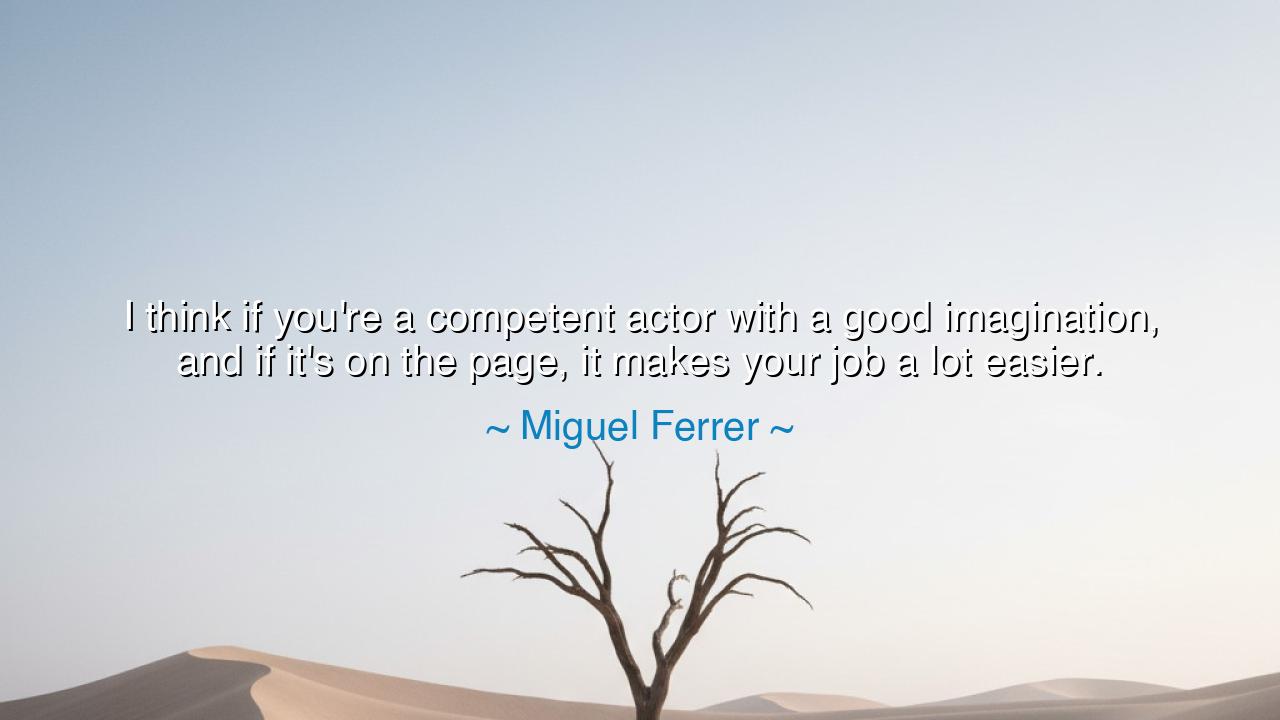
I think if you're a competent actor with a good imagination, and
I think if you're a competent actor with a good imagination, and if it's on the page, it makes your job a lot easier.






"I think if you're a competent actor with a good imagination, and if it's on the page, it makes your job a lot easier." These words from Miguel Ferrer reveal a deep truth about the nature of art and creativity. Ferrer speaks to the symbiotic relationship between the actor’s craft and the power of imagination, as well as the foundational importance of the written word. The actor’s job, he suggests, is to take what is already laid out on the page—whether it be a script or a blueprint of a character—and bring it to life. But this process is made infinitely easier when the actor is both competent in their craft and has a vivid imagination to infuse the character with life. Here, Ferrer underscores a crucial point: the actor’s imagination is not just an accessory but a vital instrument in the realization of the story.
In the world of the ancients, the concept of the actor was held in high regard. The Greek theater was a sacred space where the deepest human emotions were explored and where actors were required to invoke the gods, heroes, and mythic figures of the past. Sophocles, the great playwright of Athens, knew that the actor’s craft was not only technical but also spiritual. The actor, much like an oracle, was tasked with channeling emotion and story through the medium of performance. Just as the actor today must blend the written words with their own imagination, the Greek actor was called upon to bring to life the complex interplay of fate, emotion, and action. The role of the actor, therefore, is a profound one—requiring not only the ability to perform but to create, to make the invisible visible.
Consider the example of Aeschylus, the father of Greek tragedy, whose plays were performed in the grand Theatre of Dionysus in Athens. His works were filled with divine and human struggles that demanded profound emotional depth from the actors. Yet, even as the actors brought these gods and mortals to life, they did so within a framework provided by Aeschylus—the written word that set the stage for the performance. Aeschylus knew that a powerful performance would depend not just on the actor’s skill, but on the text itself—on the words that were written and how those words could inspire the imagination of the actor. Just as Ferrer says, if the words are on the page, the job of the actor becomes infinitely more accessible, for the foundation is already laid.
Similarly, let us look to the life of William Shakespeare, whose plays continue to captivate the world to this day. Shakespeare wrote in a time when actors had to bring his carefully crafted words to life without the aid of modern lighting or stage design. The power of his plays was in the language—how each word, each phrase, set the emotional tone and created the world of the story. Actors, like Laurence Olivier and John Gielgud, who performed Shakespeare’s works, knew that a great performance began not just with physicality or emotion, but with the imagination to bring the words to life. They understood that Shakespeare’s text was a living organism, capable of taking on new meaning each time it was performed, based on the actor’s own engagement with it. This aligns perfectly with Ferrer’s view: the imagination of the actor is crucial in making the written text not only come alive but also feel alive.
In the modern world of cinema, actors such as Ferrer himself understand the delicate balance between competence, imagination, and the power of the written word. A script is not just a blueprint for action—it is a map of emotions, relationships, and meaning, waiting to be unlocked by the actor. The actor’s role, then, is to transform the words on the page into something visceral, something felt. Ferrer suggests that this process is made easier when the actor is not only skilled in their craft but also in possession of a vivid imagination—a mind that can see beyond the words, filling in the emotional and psychological spaces between them. The act of performance is a dynamic, creative engagement with the text, a co-creation between the actor, the playwright, and the audience.
The lesson we draw from Ferrer’s words is not only one for actors but for anyone engaged in creative work. Whether we are writers, leaders, artists, or builders, we must understand that the work we do is not just about execution—it is about bringing the full force of our imagination to the task at hand. The foundation is important, yes, but it is the imagination and the drive that fill it with life and meaning. Like the actor who takes a script and breathes life into it, we too must take the plans, the ideas, the instructions before us, and transform them into something greater through our own creativity.
So, let us approach our work with both competence and imagination. Let us not wait for perfection, but trust in our ability to create with the resources we have at hand. Like Ferrer, we can find ways to make the work easier and more fulfilling by recognizing that it is not the world of actions alone that matters—it is the vision we bring to those actions that truly brings them to life. Whether on stage, in a book, or in any endeavor, it is our imagination that will unlock the potential of what we do and help us craft something far beyond what is written before us.






AAdministratorAdministrator
Welcome, honored guests. Please leave a comment, we will respond soon